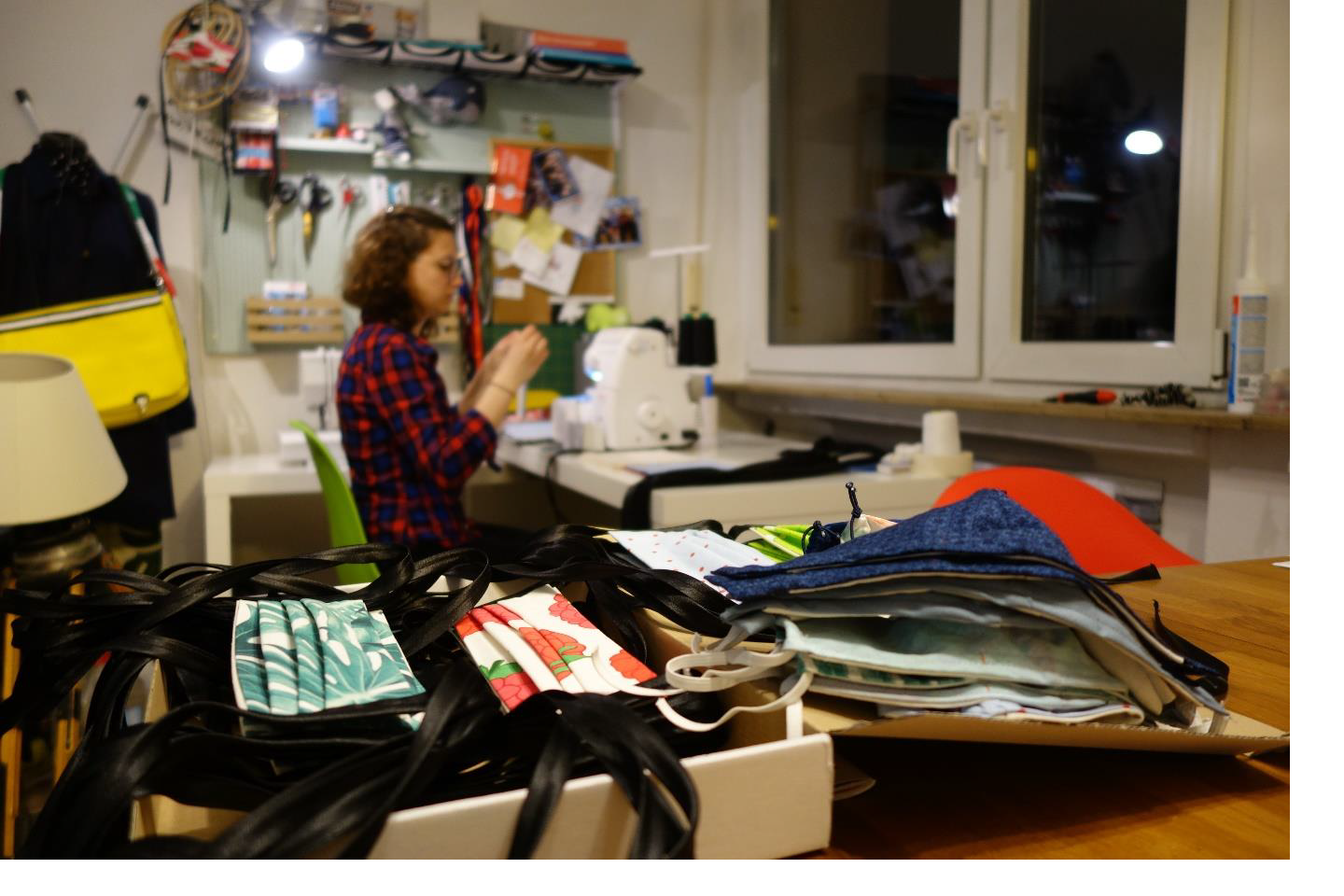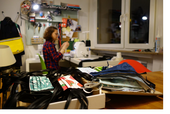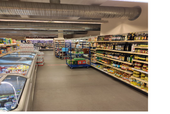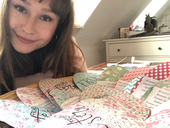The summer semester 2020 fell in the middle of the Corona period and actually presented everyone at HWG LU with new challenges. The 2nd semester of the master's program "International Marketing Management" proved that it is possible to deal with this in a positive way.
Prof. Klaus Blettner gave the participants of his course "Corporate Social Responsibility Project" a choice in the summer semester: Either prepare and present a paper on the topic of "CSR in the face of the pandemic" or do a so-called Corona substitution. Fifteen students took advantage of this opportunity, which is unique at HWG LU. They earned "social credits" by doing at least 100 hours of volunteer work.
Whether neighborhood help, youth work, agriculture, grocery retailing, childcare and much more - the master's students got involved in very different ways during the "Corona semester." And made a lasting impression on their prof...
The following is an excerpt from four final reports:
---
Victoria Berger: 324 masks sewn in night shifts
"Pre-wash, dry, iron, mark, cut, long seam right, long seam left, turn, iron smooth, iron fold, sew fold, iron to center, unfold, iron pleats, fold into pleats, pin bias tape, cut bias tape, sew bias tape right, sew bias tape left, cut threads, cut wire, bend wire, push wire into fold, check. Done. Next.
It takes a little more 24 steps to make a fabric mask, also called a makeshift or community mask.
In the weeks from mid-March to the end of May, I sewed a total of 324 of these makeshift masks for various social service agencies. It takes about 20 minutes to make a single mask in "mass production". I usually did one step for about 30 masks at a time to save some time. The masks are made of two layers of tightly woven cotton and are tied together behind the head with bias tapes. The fabric is placed in three large folds so as not to be too close to the mouth. In addition, a wire at the top is designed to improve fit and prevent fogging for eyeglass wearers. The wire is removable and the masks are washable at 60°C in the washing machine, or in a water bath on the stove.
In all, I sewed over 300 yards of bias tape, a full roll of wire, all the cotton fabric I had at home, donations from friends, and another 8 yards of newly purchased fabric. It's hard to estimate how many miles of thread went into the masks, but my 10,000-yard spools lost significant girth. For sewing, I used both my regular household sewing machine and an overlock machine, which especially made finishing the side seams cleaner and faster.
I actually started sewing masks because I overheard that my grandma's nursing home was missing masks. Since I know one of the movement therapists there well, I started by sewing masks for her and her colleagues. Once I started, I realized that many other places were also lacking supplies of masks. So I sewed more masks and gave some directly to the city of Ladenburg, which distributed the masks centrally to social institutions, nursing homes and high-risk patients in the city. The central collection point there made it very easy for me to find collection points. For this purpose, my mother had cut out an advertisement of the city of Ladenburg from the newspaper, where they asked for mask donations.
Another 72 pieces went to the refugee camp on Lesbos via the #EuropeCares initiative.
I also provided masks to some acquaintances and family, some of whom belong to the risk group. Just when the mask requirement for public spaces was announced, several private mask requests were added to the actual workload for social purposes, which then more often ended in half-night shifts. Even though I was pretty tired of it in between, it was definitely worth it and gives me a good feeling.
Because besides my studies and my job as a working student, I usually only had the evenings and weekends to sew. At these times, both my sewing machines are then running hot...and doing something productive is also a pretty good alternative to Netflix and Co."
---
Marius Brinschwitz: Volunteering at the grocery store to lend a hand
"This summer semester 2020, everything was different. In order to put a stop to the pandemic that was spreading around the world, the university's operating schedule was turned upside down and lectures were unceremoniously moved into the students' own living rooms. Instead of face-to-face interaction with professors and fellow students, the scheduled lectures took place exclusively online via video conferencing, which made it easier to get to the lecture, but also brought about changes in subject matter and content.
In the course of this, we were given the option in the Corporate Social Responsibility subject to carry out the originally planned project work or to actually lend a hand and help out at a location or company of choice. With the outbreak of the pandemic, various industries as well as certain groups of people were faced with challenges that could only be overcome to a limited extent on their own and therefore required external support.
In this context, in line with the lecture title "Corporate Social Responsibility", I wanted to take responsibility myself and make a contribution to society. With this decision, I left my phone number with various farmers in the region, signed up with the Red Cross and the Metropolhelfer as a willing worker, and actively applied to social institutions such as the Tafel. But contrary to expectations, no one really seemed to need my labor - only the Mannheimer Morgen placed me with an elderly grandmother for what ended up being a one-time shopping assistance.
[...]
I was all the more pleased when I received a voluntary temporary employment contract, complete with return slip and envelope, in my mailbox. The CAP grocery store stationed in the Lindenhof had sent me a temporary contract on a voluntary basis only three days after my online application. After I signed and returned the contract the same day, I started working right away the following week - help is needed after all, I thought to myself.
Once there, I realized relatively quickly why the CAP store would need my help: the newly established hygiene concept could not be accomplished without additional workers. It stipulated that a maximum of 20 people were allowed to be in the supermarket at any one time and that each person was required to take a shopping cart as a spacer. In order not to torpedo the measures introduced by the potential "virus slinger" shopping cart, each shopping cart also had to be disinfected after use. I was accordingly positioned at the entrance door with a neon-yellow security vest and was to provide "our" customers with the all-inclusive service: Greeting, disinfecting, handing out the shopping cart and finally saying goodbye with a smile for the way home.
The reason why the CAP store advertised a volunteer position for this job can be answered by describing the CAP store concept. Behind the CAP grocery stores is namely the Cooperative of Workshops for the Handicapped Süd eG (gdw süd), headquartered in Stuttgart. The name CAP is derived from the English term for disadvantage - handicap. The drive and goal of gdw süd is the inclusion and equality of all people from all walks of life, religions, countries and age groups. With 104 CAP stores already installed throughout Germany and over 1,500 employees, the project therefore contributes to the long-term and future-oriented creation and securing of jobs for people with disabilities. Although the first grocery store did not open until 1999, rapid nationwide expansion was evident. The rapid expansion was made possible in particular by private and government support programs, by the change to the main supplier EDEKA, which ensured competitive prices, and by the voluntary work of countless helpers. Together, these factors ensure that the majority of CAP stores are in the black and thus self-sustaining. My supervisor at the CAP store in Lindenhof was also very quick to thank me for my efforts, stating that the local store depends on volunteer helpers, especially during such additional stresses as the Corona crisis.
However, my activities did not only extend to enforcing hygiene measures. As the number of Corona cases decreased and people became more accustomed to paying attention to hygiene, my duties changed as well. After the shopping cart requirement as well as the maximum number of market visitors were relaxed, I took over normal market work such as assortment replenishment, but also other tasks reinforced by Corona, such as home delivery of groceries. Especially elderly people who could not go shopping for health reasons were delivered with the market's own VW Caddy.
After the performance of a total of 100 working hours, I now [...] with a crying and a laughing eye to the last working day for the time being. On the one hand, I am happy to have had this experience at the CAP store and to have met truly inspiring people. On the other hand, however, I also noticed that the majority of my tasks turned out to be very monotonous and that I am not studying a subject of my interest without reason. For example, I noticed that as a security guard at the door, the clock hand often seemed to stop. There was excitement only when a customer rebelled against the hygiene rules. The clear majority of people, on the other hand, showed a pronounced appreciation for my work at the door - which in turn underscored the meaningfulness and importance of my job and made me happy. So, in the end, I'm glad I got the opportunity for this experience and took advantage of it!"
---
Marie Dünschede: Helps where there is need at the moment
"Due to the current COVID-19 pandemic, the IMM230 CSR Project course offered the opportunity to support the common good in this exceptional situation through community service. The opportunity to help other people and contribute something to the management of the pandemic excited me right away. [...]
At the very beginning of the COVID-19 crisis, I decided to help out the retail sector - as an additional worker. While shopping privately, I had quickly noticed that staff was urgently needed to handle the increasing hoarding purchases of the population. Of course, I could have helped out a farmer instead, but I had already worked in retail for several years, so it only required a much shorter training period.
I was employed in a retail chain in Mannheim. My shifts started at 6:00 a.m. and I was primarily responsible for checking the best-before date and stocking the FTT (fresh meat counter). My shifts were scheduled until 8:00 a.m., however, I often worked longer to help out in other areas - such as MOPRO (dairy products).
As part of the CSR project, I also wanted to help out on a voluntary basis - in addition to helping out at the grocery store. That's why I got in touch with Caritas Mannheim. [...] My support services were primarily related to the production of respiratory masks, which were quickly sold out at the beginning of the COVID-19 crisis. However, obtaining the materials, as well as manufacturing the masks themselves, proved difficult at first. At first, it was almost impossible to get suitable elastic, and also the fabrics could only be bought online at a very high price, since all the stores had closed and the prices were constantly rising due to the increased demand. But also regarding the fabrication, I had my difficulties. Since I neither had a sewing machine, nor could I sew, I first decided to make the masks with a special fabric glue (washable up to 95°C). To my regret, after a few hours of work, I realized that these masks were not very stable. For this reason, I decided to borrow a sewing machine. Again, I encountered some problems, as I had no experience in using a sewing machine. For a mask I therefore needed on average just under an hour. In the end, I managed to make 50 decent and usable masks for Caritas Mannheim.
In addition, I also wanted to bring joy to the people in the old people's home via Caritas. Due to the increased risk of infection, visits to the old people's homes were basically forbidden for everyone - especially for the relatives. In order to make the people nevertheless a joy and to be able to replace the missing proximity to the family and friends to a certain extent, I decided to send Easter greeting cards. I tinkered each Easter greeting card individually with attention to detail and provided them with the most beautiful Easter poems.
In addition, I also occasionally made purchases for my neighbors in the house. On the second floor lives an elderly couple [...], which due to former cancer belongs to the risk group. Therefore, if their children could not take care of this, I bought necessary groceries for them a few times. [...]
[...]
Conclusion: Basically, I was enthusiastic about the possibility - within the framework of the course - to be able to help other people through various services, especially in times of a pandemic. Despite my enthusiasm for this project, I was faced with some challenges during its implementation. The working hours at the food market, aside from the need to improve my sewing skills, were probably the most challenging for me personally, as I had to get up as early as 4:30 am. However, I am anything but an early riser.
In conclusion, I can say that this project gave me a lot of pleasure because I was able to help people in emergency situations. I especially enjoyed helping Caritas. It is nice to know that you have contributed a part for the health of other people (masks) and that you could make them happy by giving them small gifts (Easter greeting cards). Therefore, for the future I have decided to continue to help Caritas through various assistance."
---
Luisa Kläger: multifaceted commitment in which she contributes her strengths
"Probably no crisis has ever affected the everyday lives of people in Germany and around the world as quickly and far-reaching as the Corona pandemic. Social distancing is on everyone's lips, and virtual encounters and meetings have become a new way of getting together. They bring long familiar things into motion and raise the question: To what extent will different areas of life and habits change in the coming years?
Student life at the School of Business and Social Studies has not been left untouched by these changes. The event "Corporate Social Responsibility Project" is a scheduled unit in the second semester of the Master's program International Marketing Management, which was conducted by Prof. Dr. Klaus Blettner in the summer semester between March and June 2020. Due to the ongoing Corona pandemic, the course of the event was subject to extraordinary framework conditions, which meant that a lecture in face-to-face form and thus also the implementation of a social event project had to be ruled out. Nevertheless, in order to contribute to the improvement of the current situation, the students of the course were free to provide social support within the scope of their individual possibilities.
My search for a suitable project initially began on the website of the city of Karlsruhe, which lists a collection of various initiatives at corona.karlsruhe.de. Thus, I became aware of the placement portals "KA hilft" and "ka-news verbindet", where I finally registered as a helper. In addition, I advertised an offer of support on Facebook with a post in the groups "Wir halten zusammen - die neue welle Nachbarschaftshilfe" and "Nachbarschaftshilfe Karlsruhe."
A friend also told me about the "Corona School" project, which arranges contact between pupils and students for virtual learning support to provide relief and a safe as well as reliable learning atmosphere. Here, too, I registered as a tutor for the subjects economics, German and English for all grades.
As a last project, I finally decided to participate in the initiative "Pen and Paper", where different generations can get in touch with each other via letters, in order to counteract the social loneliness and isolation in the current times.
Just two days after I published my ad, a granddaughter contacted me on Facebook looking for assistance with errands for her grandma in Karlsruhe, since she and the rest of the family lived in Mannheim. She finally gave me the phone number and I contacted the lady to introduce myself. It turned out that she lived just a few streets away in an assisted living home and, as a high-risk patient, could not leave the house. Accordingly, in the weeks that followed, I threw in a few letters or referrals, got new stamps and prescription medications, or did the weekly grocery shopping. She gave me the shopping list over the phone, and we arranged a time for me to bring the groceries to the entrance area of the residence. I waited outside the door until she had accepted the groceries and handed me the money through the mailbox. The exchange was very friendly, and I enjoyed talking to her on the phone for long periods of time when she needed someone to talk to.
A short time later, I had my brief interview with the Corona School to discuss important issues over video chat and to make sure I was a student. I was then assigned a student in the 13th grade for Economics and German through the portal, who I was able to meet in an initial interview through ZOOM two days later. I found it helpful that a guideline with the most important questions was designed for the first meeting, but this quickly became superfluous as the conversation went smoothly. She told me about her problems and questions in the two subjects, and we eventually arranged to video chat each week. In advance of each tutoring session, she sent me photos of the practice problems from her high school graduation preparation, and I had time to familiarize myself with the topics. At first, I had doubts about whether I had taken on too much with 13th grade, as the content was often more complex than expected and she was about to graduate from high school. However, the joint video chats showed me that it already helps her when I explain the solutions to the tasks in my own words and she can thus understand them better. She has repeatedly confirmed to me that the exchange with me brings her a lot and that she can thus effectively use the time until the postponed exams.
I was also very quickly assigned a lady in an Allgäu nursing home at the Pen and Paper Initiative to whom I could address my first letter. I told her that I found the campaign very nice and couldn't remember the last time I had written a handwritten letter. As we went on, it turned out that as a child I had often vacationed in the place where she now spent most of her life. So we wrote back and forth a few times, and the exchange was an interesting experience [...].
Finally, at the end of April, another request reached me on Facebook. A young mother told me about her problem of a new part-time job starting the first of June and that she didn't know how she and her significant other should deal with the challenge without childcare. We arranged to meet in the park, and during an extensive walk, we clarified the framework for support. After a few more meetings and walks, I finally visited the family at home and got a glimpse of the home office situation, where the three-year-old daughter was frolicking next to the workplace. So I visited about twice a week to watch the little girl and found myself surrounded by puzzles, sticker albums, and puppet shows.
Conclusion: In summary, it gave me great pleasure to be involved in this way and to be able to provide at least a little help at one point or another. I asked myself early on whether I would have offered this support even without the study project. I had the idea of volunteering very early on, but I don't think I would have gotten involved to this extent, but perhaps only within the framework of the Corona School. Accordingly, the project helped me to get involved beyond that and to make new contacts despite the social distance. Although my capacities were definitely stretched in some places besides my studies and a working student job, I am glad to have made these acquaintances that will certainly last beyond this time. I was very touched by the kind words my tutoring student addressed to me after she graduated from high school and the heartfelt thank-you I received from the little girl's mother and the lady at the assisted living facility, and they were all worth the effort."








